DANIELLE DULKEN
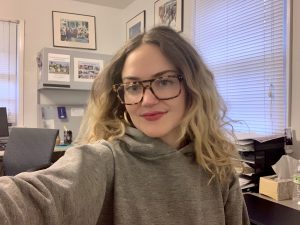 Danielle Dulken is a PhD Candidate in the Department of American Studies and the HPG fellow for the Marian Cheek Jackson Center (2018-2019, 2019-2020). An oral historian, Danielle has worked with students at UNC-Chapel Hill to develop the Jackson Center’s Oral History Trust, recorded community histories at annual events like the annual Northside Festival, co-led oral history workshops to support a neighbor-to-neighbor oral history initiative, and is currently processing archival research to help produce an exhibition on the history of Northside teachers, entrepreneurs, and artists opening summer 2020. At the Jackson Center, Danielle’s learns from a team of integral, local advocates who steer the Jackson’s Centers major projects and events. In this way, the public determines how her skill-set can support their needs. This shifts Danielle’s academic work away from the idealized model of scholarly expression and toward a model of public humanities wherein the benefactors range from students to the Jackson’s Center’s staff to the people of Northside, Tin Top, Pine Knolls, and beyond. The relationship is symbiotic and while Danielle’s work at the Jackson Center follows their commitments to local residents, she too has gained an important perspective on the possibilities of academic training for a public good.
Danielle Dulken is a PhD Candidate in the Department of American Studies and the HPG fellow for the Marian Cheek Jackson Center (2018-2019, 2019-2020). An oral historian, Danielle has worked with students at UNC-Chapel Hill to develop the Jackson Center’s Oral History Trust, recorded community histories at annual events like the annual Northside Festival, co-led oral history workshops to support a neighbor-to-neighbor oral history initiative, and is currently processing archival research to help produce an exhibition on the history of Northside teachers, entrepreneurs, and artists opening summer 2020. At the Jackson Center, Danielle’s learns from a team of integral, local advocates who steer the Jackson’s Centers major projects and events. In this way, the public determines how her skill-set can support their needs. This shifts Danielle’s academic work away from the idealized model of scholarly expression and toward a model of public humanities wherein the benefactors range from students to the Jackson’s Center’s staff to the people of Northside, Tin Top, Pine Knolls, and beyond. The relationship is symbiotic and while Danielle’s work at the Jackson Center follows their commitments to local residents, she too has gained an important perspective on the possibilities of academic training for a public good.
SAMAH CHOUDHURY
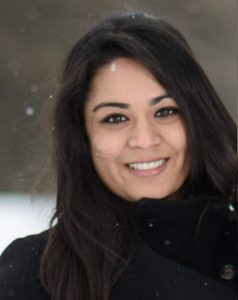 The Carolina Public Humanities (CPH) Strategic Collaboration Fellowship allowed Samah Coudhury to work with two different divisions in CPH: the Humanities on the Road Initiative and the Maynard Adams Fellows. Here, she learned first-hand how highly interpersonal the work of public humanities is: From collaborating on grant proposals, to bringing in local professionals and non-profits for their expertise on a given topic, Samah believes that the public good is served best when we work transparently and collectively. She has helped organize community events on ethical meat consumption, the local histories of western North Carolina, and even the National High School Ethics Bowl for high school students. Samah witnessed that the labor required to make such a breadth of accessible programming possible (and for the most part, free!) means devoting a considerable amount of time to development-type work. The combination of collaborative interpersonal work coupled with administrative duties helped her build skills that she will continue to apply both in the academy, and in her public scholarship.
The Carolina Public Humanities (CPH) Strategic Collaboration Fellowship allowed Samah Coudhury to work with two different divisions in CPH: the Humanities on the Road Initiative and the Maynard Adams Fellows. Here, she learned first-hand how highly interpersonal the work of public humanities is: From collaborating on grant proposals, to bringing in local professionals and non-profits for their expertise on a given topic, Samah believes that the public good is served best when we work transparently and collectively. She has helped organize community events on ethical meat consumption, the local histories of western North Carolina, and even the National High School Ethics Bowl for high school students. Samah witnessed that the labor required to make such a breadth of accessible programming possible (and for the most part, free!) means devoting a considerable amount of time to development-type work. The combination of collaborative interpersonal work coupled with administrative duties helped her build skills that she will continue to apply both in the academy, and in her public scholarship.
MICHAEL J. BRAMWELL
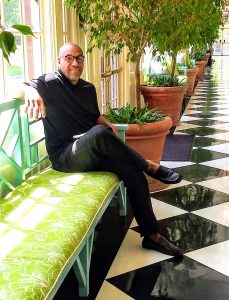 Michael J. Bramwell was awarded a year-long, Andrew W. Mellon Learning Resource Graduate Fellowship at the Ackland Art Museum that afforded him the opportunity to develop curriculum and instructional materials in Social Studies, Science, English, Language Arts, and Visual Art that met Common Core and North Carolina Essential Standards. He worked with diverse publics including: K-12 teachers, students, docents and gained expertise in African, Asian, and contemporary art. The fellowship contributed to his professional development as a practicing artist and helped build networks between cultural and educational organizations. Through the fellowship, the museum’s art collection was made accessible to school children, teachers, and members of non-traditional and underrepresented communities.
Michael J. Bramwell was awarded a year-long, Andrew W. Mellon Learning Resource Graduate Fellowship at the Ackland Art Museum that afforded him the opportunity to develop curriculum and instructional materials in Social Studies, Science, English, Language Arts, and Visual Art that met Common Core and North Carolina Essential Standards. He worked with diverse publics including: K-12 teachers, students, docents and gained expertise in African, Asian, and contemporary art. The fellowship contributed to his professional development as a practicing artist and helped build networks between cultural and educational organizations. Through the fellowship, the museum’s art collection was made accessible to school children, teachers, and members of non-traditional and underrepresented communities.
CAROLIN SÜDKAMP
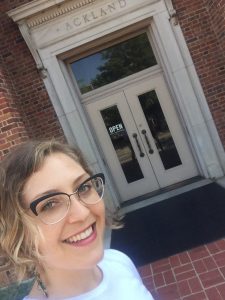 Carolin Südkamp received the Ackland Art Museum Learning Resource Fellowships during the academic year 2018-2019. In her project, she was assigned to museum galleries and tasked to develop educational materials, tours, activities, and resources under consideration of docent needs, teacher requirements, and NC standards objectives. She drew on research and pedagogical skills to work with the community stakeholders in order to devise educational materials and resources for the public good and with the public. The project emphasized working with diverse stakeholders at the core of the learning and knowledge production at the Ackland: volunteer docents, K-12 teachers and students, and museum staff. In order to understand the needs of the Ackland’s primary audiences, she attended docent training sessions and teacher events, presented at a docent workshop, and observed K-12 tours. During the fellowship, the community stakeholders provided feedback, asked questions, and raised concerns that she addressed in four different museum tour write-ups, including activities, questions, and description of art works.
Carolin Südkamp received the Ackland Art Museum Learning Resource Fellowships during the academic year 2018-2019. In her project, she was assigned to museum galleries and tasked to develop educational materials, tours, activities, and resources under consideration of docent needs, teacher requirements, and NC standards objectives. She drew on research and pedagogical skills to work with the community stakeholders in order to devise educational materials and resources for the public good and with the public. The project emphasized working with diverse stakeholders at the core of the learning and knowledge production at the Ackland: volunteer docents, K-12 teachers and students, and museum staff. In order to understand the needs of the Ackland’s primary audiences, she attended docent training sessions and teacher events, presented at a docent workshop, and observed K-12 tours. During the fellowship, the community stakeholders provided feedback, asked questions, and raised concerns that she addressed in four different museum tour write-ups, including activities, questions, and description of art works.
MICHAEL LEVINE
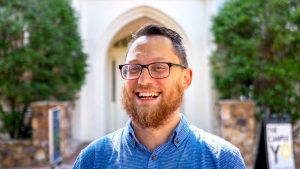 During his time working as a Humanities for the Public Good fellow at the National Humanities Center, during the summer of 2019, Michael Levine was given the unique opportunity to design and build an interactive digital map that highlights the work of dozens of scholars who have worked at NHC in the past, and whose research focuses on the environmental humanities in a wide number of global areas: from the rain forests of central Brazil to rural destinations across northern China. The interactive map utilizes a custom embedded Google Map, coupled with categorized markers that, when clicked, reveal detailed information about the important work of these scholars. Through this immersive experience, the interactive map reveals both the depth and breadth of environmental research conducted by notable scholars across a wide range of disciplinary interests, and makes their work accessible to the public. The interactive map will appear live on NHC’s website later this year.
During his time working as a Humanities for the Public Good fellow at the National Humanities Center, during the summer of 2019, Michael Levine was given the unique opportunity to design and build an interactive digital map that highlights the work of dozens of scholars who have worked at NHC in the past, and whose research focuses on the environmental humanities in a wide number of global areas: from the rain forests of central Brazil to rural destinations across northern China. The interactive map utilizes a custom embedded Google Map, coupled with categorized markers that, when clicked, reveal detailed information about the important work of these scholars. Through this immersive experience, the interactive map reveals both the depth and breadth of environmental research conducted by notable scholars across a wide range of disciplinary interests, and makes their work accessible to the public. The interactive map will appear live on NHC’s website later this year.
